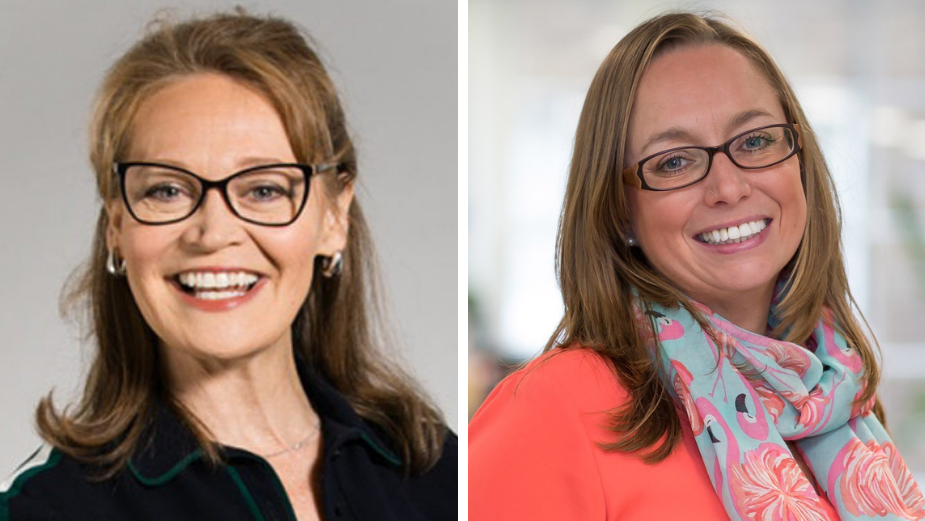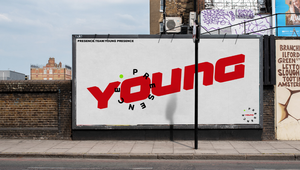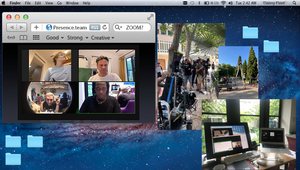
“We Need To Use Our Creative Skills To Help the World Navigate Out of This Crisis”

When the pandemic swept through the world, grinding an industry reliant on movement to a halt, conversations around climate and sustainability became impossible to ignore. In an effort to keep this positive momentum going, UK production company Presence has partnered with LBB to support a brand new Sustainability Channel for essential discussion around green practices and knowledge sharing.
To kick off this series, LBB joins APR founder and global CEO Jillian Gibbs, and APR director of industry relations Traci Dunne to dive into this important, and urgent, topic. As a founding member of AdGreen, APR is helping to support impactful initiatives such as the introduction of AdGreen’s carbon calculator which will give advertising agencies, production companies and service companies the ability to collaboratively measure the carbon impact of their projects and to identify the highest carbon producing activities.
In this interview, Jillian and Traci share insights into the advertising production industry’s biggest problem areas and how to tackle them, making an important note that all is not lost if we set achievable targets and start our journeys now.
LBB> Tell us a little bit about your personal relationship and journey with sustainability.
Jillian Gibbs> I grew up in New York City and I was a Girl Scout, and their motto is “leave a place better than you found it.” And in Colorado, where I live now, there’s a similar motto for hikers and campers - you pack up everything that you brought in with you. So I've always had this mentality, and as producers when we’re on location bringing in 50-75 people, that is the motto for the film industry too. Don’t leave anything or anyone behind.
Traci Dunne> I started my career working at ISBA, the UK trade association, and during my time there I started meeting with Jo Coombes, who is the project director of AdGreen and she was so inspirational. We spoke a lot about sustainability within production and I remember it being a real lightbulb moment once I started to understand that this corner of our industry was having such a huge impact on the environment.
LBB> What are some of the biggest sustainability issues to tackle within the production industry and what solutions are there so far?
Jillian> I think there are really three areas that marketing organisations and agencies can focus on that will make a difference. The first is challenging the norm for production by ensuring that things don't go back to normal and considering a new normal. There is an overpopulation on shoots where everyone thinks they need to be there and that their contribution is essential, which can result in heaps of travel and a huge carbon footprint. We recommend redefining shoot attendance expectations.
The second thing is to manage the waste from shoots, especially those productions that require building sets because there's building materials, such as lumber and paint, and other things that can be considered reusable assets. For example, there are a few companies around the globe that help advertisers and their agencies create more eco-conscious set designs and manage the dispersion and donation of props and wardrobe to places like local theatres and schools. Even better would be the use of digital wall displays that replace the need to travel to a location or build an elaborate set.
The third is to create an awareness of best practices by updating production guidelines, creating protocols for how we're going to commit to change and make a difference.
Traci> On the subject of waste, when organisations are setting themselves a zero-waste ambition for their shoots, what needs to be understood is that just having recycling bins available is not going to achieve that. Zero-waste from a sustainability claims perspective actually means that you have managed to divert 90% of your waste from landfill. Therefore you really have to look at the materials that you're using, because they have to be 100% recyclable or post-consumer to be truly recyclable and not end up as landfill. You need to look early on up the chain to consider where you're sourcing your materials for zero-waste to be achieved.
LBB> How is technology shaping and making green/sustainable production possible?
Jillian> This is a fascinating area. Virtual video villages, remote production, virtual post-production and tools to review and approve things online are just some of the ways that technology is supporting more sustainable and green production. Another is something that was developed out of the Disney+ series, The Mandalorian. The director and writer, Jon Favreau, came up with a technology to project an image on a wall and film the actors in front of the projection, thus avoiding the need to fly around the world to a location (limited in 2020 by Covid and shrinking budgets) or even build elaborate sets because he created an environment, virtually. When you watch from the beginning of the series, which was filmed at the start of the pandemic, you can see how the technology improved as they filmed the series.
Traci> And then there’s AdGreen’s carbon calculator that is going to help drive behaviour change. We’re incredibly excited from a technology perspective - it's the first time we're going to be able to measure the actual footprint of a production and have empirical data telling us exactly where we need to improve.
LBB> AdGreen aims to measure the carbon footprint of advertising production and empower the industry to reduce emissions for zero carbon / zero waste. What has the reaction been like to the industry levy that is being introduced to fund the AdGreen Initiative? And how do you hope to grow its impact?
Traci> The need for AdGreen is clear. We need the calculator and we need everyone to be inputting their data so that they're driving that essential behaviour change. But, as is the case with all new industry initiatives, there are going to be some teething problems and sign offs that need to happen. There are going to be corporate hoops that people have to jump through to make it work and we’re at the stage where all of that needs to be worked through.
We're making great progress at the moment and there's been some fantastic work behind the scenes to make sure the set up is as straightforward as it possibly can be, both for levy collectors and levy payers. I personally think that eventually it will all be accepted, just as with any other levy that's ever been introduced. Once it becomes the norm, you won't remember when it wasn't there.
LBB> Do you feel that people are going to rush to go back to normal because they've been held at home for so long? Is the industry ready for the shift to sustainable production for the long term?
Jillian> We've been talking to many clients and most are eager to get back on set but with the idea of being more intentional about who goes, for how long, and for what purpose. There is something to be said in the creative process for being interactive, so I do think that they're interested in getting to some shoots, but not all shoots. And now that we, as an industry, are more confident in overseeing a live-action shoot remotely, we can use remote production tools to train our marketing and agency teams.
Traci> We’re all human and we’re excited about being together again. But instead of waiting to get back to what was once considered normal, we need to learn from what we were able to do in COVID, and as Jillian just said, be more intentional about what is and isn't going to be completely necessary going forward.
Smaller companies are going to find it slightly easier to adapt, and make organisational decisions that will filter down quicker to the whole. But large organisations are making bigger commitments, which is really key for the industry.
Jillian> I think the larger advertisers and the bigger holding companies can make a huge impact. They will implement and invest in changes that are really necessary, and they will be the ones to create a model and set the expectations that others will follow.
I'm hearing more and more advertisers talk about sustainability and how important it is to them, and they will influence the industry at large, but the advertising agency holding companies have an opportunity to introduce sustainability. So I'd like to make a plea for the larger holding companies to invest in their people, to educate them on how to be more sustainable, and be intentional about helping to make a difference.
LBB> What would you say to people who believe that interacting in-person less is going to impact creativity? Is there a misconception that this way of working is stifling?
Jillian> Just look at all the amazing work that's been done since the pandemic and producing within the confines of remote working. The proof is already there. I think we would be remiss and irresponsible not to take a moment to consider how we’re going to do things differently so that we can make a difference to the environment.
Traci> I couldn't agree more. And the other side of the coin is that there is a call to action for the entire advertising industry to use our creative skills to try and help the world navigate us out of this crisis. It is our collective responsibility to show the world that it is possible to make fantastic advertising sustainably and with sustainable messaging in it. We are the most creative people in the world, so we should be using those skills to amplify this movement rather than being scared of it.
LBB> How did APR respond as a company? What initiatives or actions have been put in place over recent years?
Traci> I was delighted when I joined just over two years ago to find that APR had actually been talking about sustainability in production for a good 10 years before I arrived, so I found I was pushing on an open door when talking to the senior leadership team about further activities we should consider within sustainability.
As a founding member of AdGreen, we supplied some of the funding and resources they needed to bring the carbon calculators to market, and we sit on their board and their financial committee to help in the running of the initiative. We’re also signed up to AdNetZero, and equally sit on their steering committee. We recently started our own organisational carbon audit too so that we can commit our data to the net zero industry pool and start our own carbon reduction journey.
Our mission statement has three key pillars that we have committed to: industry participation, financial commitment, and client education and support. Within that we have developed our own service offering, so we can work with our clients to help them move past theory into practice, delivering educational decks to raise awareness, and helping them develop a carbon reduction strategy.
Jillian> We also have a list of best practices for marketing organisations to include in their production guidelines so that when they onboard their agencies and their production partners, they understand the expectations for the production process.
LBB> Have you been inspired to change any of your own habits over the pandemic for a more sustainable way of living?
Traci> I'm not sure whether or not it was directly connected to the pandemic, but I've certainly gone bonkers on sustainable alternatives at home. I’m always looking at things that we didn't consider to be bad before, now realising that even what we wash up with needs to improve. I've gone 100% renewable trying to make my home as sustainable as possible, and more importantly, educating my young son in all things sustainability so that he grows up completely aware of what is and is not going to help us get out of this climate crisis.
Jillian> And for me, I took my first trip to the dump! It was a huge, eye-opening experience to see the amount of trash we make and how it is organised and buried. I try to use sustainable products, things that are repurposed or recycled and I grow many of my own vegetables. But the biggest thing for me is the reduction in travel. I traveled 70% of the time and I’ve cut back tremendously, fell in love, and well, here we are (wink).
LBB> What advice do you have for brands when it comes to creating briefs with sustainability in mind?
Traci> It's all about consideration at the very beginning of the creative process, all the way from the creative brief through to production, because the reality is that many of the really big carbon impacts are already baked into a script by the time it makes it to pre-production. And so, it's not always very easy to do anything about it at that point. You can obviously still make some changes, but if a huge amount of travel (especially long-haul travel) has already been built in because you need a sunny beach in November (coming from a UK perspective), there's not going to be much you can do about travel. So agencies need to be encouraged –in some ways be given – ‘permission’ to respond to those early briefs in a sustainable way, both on screen and behind the scenes.
Jillian> There is much to consider… travelling to a location versus set construction is a creative consideration that will reduce waste but potentially increase the carbon footprint. We’ve got to consider the pros and cons and the impact of each. When utilising virtual environments, like digital walls versus flying to location, there are costs involved in creating a digital wall, obviously. But being good to the planet should outweigh some of those costs. I think sometimes you need to make an investment to do the right thing versus be driven by cost savings.
LBB> And finally, when it comes to tackling such a huge topic as sustainability, what advice do you have for the ad industry on where to start and how to keep up momentum?
Jillian> I truly believe that this has to be a movement in our industry. We need to take the time to learn about the resources in the initiatives like AdGreen and AdNetZero in the UK and use it to influence the world.
Traci> Support for the movement is key. It can't go anywhere unless people get on board. It's about deciding what is going to be achievable for you as an organisation and by when. And then setting achievable targets. People can get very overwhelmed about the fact that at one point we have to be completely net zero and how we’re going to get there. That’s why you need to focus on achievable targets. If you try and set something too ambitious and you fail, it's going to disenchant everybody involved, so that's really key in bringing everybody on the journey.
I do fear that there's going to be a mad panic in two or three years' time, when organisations start to realise that they have a whole supply chain they haven't started to tackle yet, so I think it's about getting ahead of that and starting your journey now.
Jillian> There's a lot to be optimistic about. 2020 proved to us that where there is a will, there is a way. Let's put our creative minds to work to find solutions to these problems. All is not lost and we still have time to make a difference.













